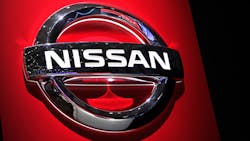Nissan Motor Co. Ltd. will become the U.K.’s first automaker that allows people with electric cars to make money by selling excess energy back onto the grid — a move meant to boost sales by showing battery-powered vehicles can do more than just drive.
Nissan announced a partnership with Enel SpA on Tuesday in London that will unite Japan’s second-biggest carmaker with Italy’s biggest utility. Together they’ll enable drivers of Nissan Leaf battery-powered cars and e-NV200 electric vans to sell excess energy during periods of peak demand — effectively turning automobiles into mobile power sources competing with the likes of Tesla Motors Inc.’s Powerwall battery.
“We believe electric vehicles can become a mobile power unit,” Nissan’s chairman for Europe Paul Willcox said. “Customers can save money on their energy bills.”
The alliance could give consumers another reason to consider a switch to electric vehicles. While countries like China and Germany offer subsidies to buy battery-powered cars, consumer anxiety over their limited range and higher prices have muted adoption. Now, in the wake of Volkswagen AG’s emissions-cheating scandal and with automakers forced by regulators to cut pollution, Nissan and Enel are betting that sentiment will begin turning in favor of electric cars.
Nissan and Enel will trial their program by identifying 100 drivers of electric vans and cars in the U.K., who will be provided with Enel’s “vehicle-to-grid” software, which allows the electricity to be traded through National Grid Plc. If the program is a success, it will be rolled out on a commercial basis, said Ernesto Ciorra, head of innovation and sustainability for Enel, in an interview.
Dubbed “xStorage,” the energy storage unit will be available in October and was developed by Nissan and Eaton Corp., which has also entered the partnership. The system will be priced starting at 4,000 euros ($4,570).
The “biggest challenge we’ve faced” when launching electric vehicles was “anxiety,” Nissan’s Willcox said at the event while adding “we still have an education job to do.”
To that end, government regulators need to continue playing a role by encouraging the industry and consumers to move away from diesel- and gas-driven cars, according to Willcox, who said he believes rules will become more stringent and that some costs will be borne by consumers. There should be higher taxes on vehicles emitting higher levels of carbon dioxide, he told Bloomberg in an interview.
“Any responsible person would say that’s the best way to go,” Willcox said.
Once governments do put in place regulations to cut pollution from the transport sector, a quarter of the world’s cars will be an electric by 2040, according to forecasts from Bloomberg New Energy Finance. The absence of rules until now has undercut sales. Less than 1% of vehicles on the road in Europe are powered with electric motors, according to Automotive Industry Data Ltd.
For Enel, which is in talks to install the technology at Schipol Airport in Amsterdam, the partnership could also help its grid by balancing intermittent supplies of solar and wind power. Storage technology could help save U.K. consumers as much as 2.4 billion pounds ($3.46 billion) a year by 2030, according to a report funded by EON AG, SSE Plc and Scottish Power Ltd.
By Ania Nussbaum and Jessica Shankleman
About the Author
Bloomberg
Licensed content from Bloomberg, copyright 2016.
